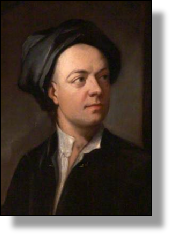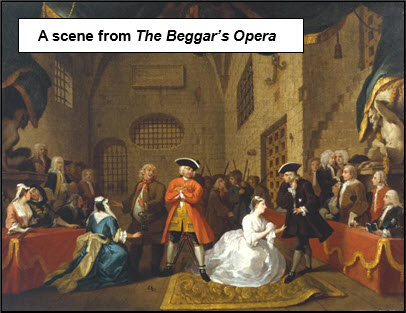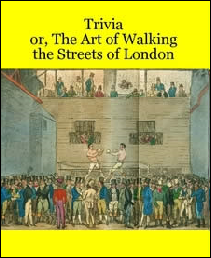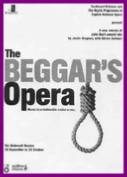


JOHN GAY 1685 -
xxxxxThe burlesque The Beggar's Opera of 1728, one of the finest pieces of social and political satire, was immensely successful and brought fame and fortune to the English poet and dramatist John Gay. Written in the form of a ballad opera, the story of Polly's love for the dashing highwayman Captain Macheath is told by dialogue interspersed with popular aires and folk songs. It delighted its audiences by its witty humour, daring satire, and catchy old airs -
 xxxxxThe Beggar's Opera of 1728, a dramatic burlesque by the English poet and playwright John Gay, was an instant and phenomenal success. Itxran for 62 performances, a record for those times, and delighted its audiences by its good humour, light hearted wit, hard-
xxxxxThe Beggar's Opera of 1728, a dramatic burlesque by the English poet and playwright John Gay, was an instant and phenomenal success. Itxran for 62 performances, a record for those times, and delighted its audiences by its good humour, light hearted wit, hard-
xxxxxBut this unprecedented success was not to everyone's liking. The plot itself - lasses in general, and the Whig administration in particular. Indeed, certain stage characters -
lasses in general, and the Whig administration in particular. Indeed, certain stage characters -
xxxxxGay was born in Barnstaple, Devon, England, and attended the local grammar school before working for a short time as a silk merchant's apprentice. In 1708 he published his first burlesque Wine and this started him on his literary carer. His first poem, Rural Sports, was written in 1713, and by that time he had became friendly with Alexander Pope, and the producers of the Spectator, Richard Steele and Joseph Addison. Together with Pope, Swift, John Arbuthnot and Thomas Parnell, the "wits" of the Augustan age in English literature, he was a founder member of the Scriblerus Club, and contributed to the club's Memoirs of Martin Scriblerus, aimed at ridiculing inferior poetry and pedantry.
 xxxxxGay is remembered above all for The Beggar's Opera -
xxxxxGay is remembered above all for The Beggar's Opera -

xxxxxThe Beggar's Opera, one of the most successful satires of all time, has secured for Gay a firm place in the history of English literature. A witty and able man, he was one of the leading poets and playwrights in England at this time. He made a fortune out of his literary efforts and, so we are told, lost much of it as a victim of the catastrophic South Sea Bubble. Nonetheless he died a very rich man. He was buried in Westminster Abbey, next to the great poet, Geoffrey Chaucer, where his epitaph, written by Pope, reads:
Life is a jest, and all things show it,
I thought so once, and now I know it.
xxxxxIncidentally, the social satire, The Beggar’s Opera, was the inspiration for The Threepenny Opera, (a dig at capitalism), produced exactly two hundred years later in 1928 by the German playwright Bertolt Brecht and the German-
xxxxx...... Thexfamous London theatre Covent Garden was opened in 1732 and The Beggars Opera was the first opera to be performed there. Officially named the Royal Italian Opera House, it has indeed become famous for its operatic productions.
Acknowledgements
Gay: after the English painter of Dutch extraction John Vanderbank (1694-
G2-


